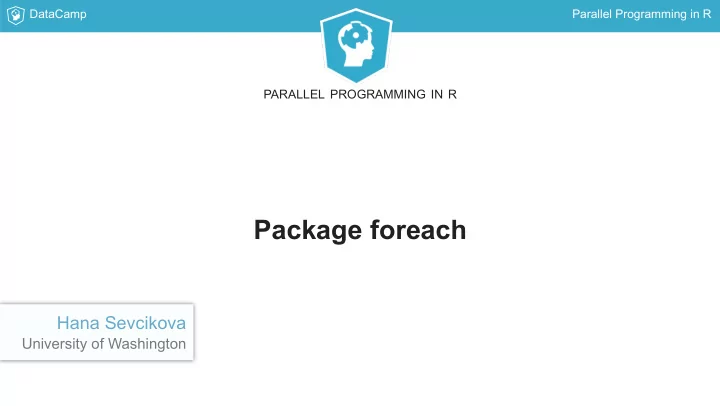

DataCamp Parallel Programming in R PARALLEL PROGRAMMING IN R Package foreach Hana Sevcikova University of Washington
DataCamp Parallel Programming in R What is foreach for? Developed by Rich Calaway and Steve Weston. Provides a new looping construct for repeated execution. Supports running loops in parallel. Unified interface for sequential and parallel processing. Greatly suited for embarrassingly parallel applications.
DataCamp Parallel Programming in R foreach looping construct foreach(...) %do% ... library(foreach) foreach(n = rep(5, 3)) %do% rnorm(n) [[1]] [1] -0.6264538 0.1836433 -0.8356286 1.5952808 0.3295078 [[2]] [1] -0.8204684 0.4874291 0.7383247 0.5757814 -0.3053884 [[3]] [1] 1.5117812 0.3898432 -0.6212406 -2.2146999 1.1249309
DataCamp Parallel Programming in R Iteration variables foreach(n = rep(5, 3), m = 10^(0:2)) %do% rnorm(n, mean = m) [[1]] [1] 0.3735462 1.1836433 0.1643714 2.5952808 1.3295078 [[2]] [1] 9.179532 10.487429 10.738325 10.575781 9.694612 [[3]] [1] 101.51178 100.38984 99.37876 97.78530 101.12493
DataCamp Parallel Programming in R Combining results foreach(n = rep(5, 3), .combine = rbind) %do% rnorm(n) [,1] [,2] [,3] [,4] [,5] result.1 -0.6264538 0.1836433 -0.8356286 1.5952808 0.3295078 result.2 -0.8204684 0.4874291 0.7383247 0.5757814 -0.3053884 result.3 1.5117812 0.3898432 -0.6212406 -2.2146999 1.1249309 foreach(n = rep(5, 3), .combine = '+') %do% rnorm(n) [1] 0.06485897 1.06091561 -0.71854449 -0.04363773 1.14905030
DataCamp Parallel Programming in R List comprehension foreach(x = sample(1:1000, 10), .combine = c) %:% when(x %% 3 == 0 || x %% 5 == 0) %do% x [1] 372 906 201 894 940 657 625
DataCamp Parallel Programming in R PARALLEL PROGRAMMING IN R Let's practice!
DataCamp Parallel Programming in R PARALLEL PROGRAMMING IN R foreach & parallel backends Hana Sevcikova University of Washington
DataCamp Parallel Programming in R Popular backends doParallel ( parallel ) doFuture ( future ) doSEQ (for consisent sequential interface)
DataCamp Parallel Programming in R Package doParallel (Rich Calaway et al.) Interface between foreach and parallel Must register via registerDoParallel() with cluster info Quick registration: library(doParallel) registerDoParallel(cores = 3) using multicore functionality for Unix-like systems (fork) using snow functionality for Windows systems
DataCamp Parallel Programming in R Package doParallel (Rich Calaway et al.) Register by passing a cluster object: library(doParallel) cl <- makeCluster(3) registerDoParallel(cl) will use snow functionality
DataCamp Parallel Programming in R Using doParallel Sequential: library(foreach) foreach(n = rep(5, 3)) %do% rnorm(n) Parallel: library(doParallel) cl <- makeCluster(3) registerDoParallel(cl) foreach(n = rep(5, 3)) %dopar% rnorm(n) [[1]] [1] -1.16719198 -0.03600075 -0.59728324 1.03807353 -0.05085617 [[2]] [1] 0.3700061 -0.4193585 0.1311767 0.6566272 -0.0371627 [[3]] [1] 0.9872227 -1.1697387 0.3992779 -0.1556074 -1.0345713
DataCamp Parallel Programming in R Package doFuture (Henrik Bengtsson) On top of the future package How to plan the future: sequential cluster multicore multiprocess future.batchtools : run processes on HPC clusters (Torque, Slurm, SGE etc.)
DataCamp Parallel Programming in R Using doFuture library(doFuture) registerDoFuture() Cluster plan: plan(cluster, workers = 3) foreach(n = rep(5, 3)) %dopar% rnorm(n)
DataCamp Parallel Programming in R Using doFuture Multicore plan: plan(multicore) foreach(n = rep(5, 3)) %dopar% rnorm(n)
DataCamp Parallel Programming in R PARALLEL PROGRAMMING IN R Let's practice!
DataCamp Parallel Programming in R PARALLEL PROGRAMMING IN R Packages future and future.apply Hana Sevcikova University of Washington
DataCamp Parallel Programming in R Package future Developed by Henrik Bengtsson (now also funded by R Consortium) Uniform way to evaluate R expressions asynchronously Provides a unified API for sequential and parallel processing of R expressions Processing via a construct called future An abstraction for a value that may be available at some point in the future
DataCamp Parallel Programming in R What is a future? Example in plain R: x <- mean(rnorm(n, 0, 1)) y <- mean(rnorm(n, 10, 5)) print(c(x, y)) Via implicit futures: x %<-% mean(rnorm(n, 0, 1)) y %<-% mean(rnorm(n, 10, 5)) print(c(x, y)) Via explicit futures: x <- future(mean(rnorm(n, 0, 1))) y <- future(mean(rnorm(n, 10, 5))) print(c(value(x), value(y)))
DataCamp Parallel Programming in R Sequential and parallel futures Sequential: plan(sequential) x %<-% mean(rnorm(n, 0, 1)) y %<-% mean(rnorm(n, 10, 5)) print(c(x, y)) Parallel: plan(multicore) x %<-% mean(rnorm(n, 0, 1)) y %<-% mean(rnorm(n, 10, 5)) print(c(x, y))
DataCamp Parallel Programming in R Package future.apply Developed by Henrik Bengtsson Provide parallel API for all the apply functions in base R using futures Sibling to foreach Functions: future_lapply() , future_sapply() , future_apply() , ...
DataCamp Parallel Programming in R Example of future.apply Using lapply() : lapply(1:10, rnorm) Using future_lapply() sequentially: plan(sequential) future_lapply(1:10, rnorm) Using future_lapply() on a cluster: plan(cluster, workers = 4) future_lapply(1:10, rnorm)
DataCamp Parallel Programming in R
DataCamp Parallel Programming in R PARALLEL PROGRAMMING IN R Let's practice!
DataCamp Parallel Programming in R PARALLEL PROGRAMMING IN R Scheduling and Load Balancing Hana Sevcikova University of Washington
DataCamp Parallel Programming in R
DataCamp Parallel Programming in R
DataCamp Parallel Programming in R
DataCamp Parallel Programming in R
DataCamp Parallel Programming in R How to chunk in parallel? Group 10 tasks into 2 chunks using the parallel package: splitIndices(10, 2) [[1]] [1] 1 2 3 4 5 [[2]] [1] 6 7 8 9 10 clusterApply(cl, x = splitIndices(10, 2), fun = sapply, "*", 100) [[1]] [1] 100 200 300 400 500 [[2]] [1] 600 700 800 900 1000 Built into functions parApply() and friends (arg. chunk.size for R >= 3.5)
DataCamp Parallel Programming in R How to chunk in foreach and future.apply? For foreach , use functions from the itertools package, e.g.: foreach(s = isplitVector(1:10, chunks = 2)) %dopar% sapply(s, "*", 100) For future.apply , use argument future.scheduling , e.g. one chunk per worker (default): future_sapply(1:10, `*`, 100, future.scheduling = 1) one chunk per task: future_sapply(1:10, `*`, 100, future.scheduling = FALSE)
DataCamp Parallel Programming in R PARALLEL PROGRAMMING IN R Let's practice!
Recommend
More recommend